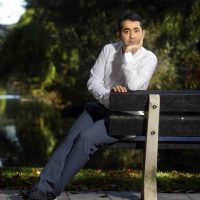The hidden voice
Really improving social safety requires listening to hidden voices, especially those pushed out or choosing silence, writes our new columnist Ali Vahidi. This avoids superficial measures that do not work.
Really improving social safety requires listening to hidden voices, especially those pushed out or choosing silence, writes our new columnist Ali Vahidi. This avoids superficial measures that do not work.

(Photo: Sam Rentmeester)
Survivorship bias extends far beyond its historical roots in World War II, where it influenced the evaluation of warplanes by focusing solely on those that returned and neglecting those lost in battle. This bias occurs when we concentrate on the survivors of a process, ignoring those who did not make it, leading to biased conclusions. Initially, engineers inspected the planes that returned from battle for bullet holes and recommended reinforcing the most damaged areas. However, statistician Abraham Wald provided a crucial insight: the undamaged areas needed reinforcement instead. His reasoning was simple: the planes that survived were hit in non-critical areas, whereas those struck in critical regions did not return.
This concept remains highly relevant today, especially in discussions about improving social safety at academic institutions. Efforts often focus on feedback from those still within the system, potentially missing critical insights. For instance, at TU Delft, when trying to understand why PhD students often fail to graduate on time, the focus is usually on current students, often newcomers who are optimistic and perhaps unaware of deeper challenges, and supervisors, who may be part of the problem. This approach overlooks crucial voices: those who drop out, finish after prolonged periods, or leave academia due to negative experiences. Toxic cultures and systemic barriers often silence or push these individuals out, preventing their perspectives from informing improvements.
Merely involving external experts is not enough, especially at technical universities
Human issues are complex, and relying solely on feedback from those who remain is insufficient. Management teams sometimes justify inaction by saying “No one came to us”, implying they would have acted if informed. This mindset ignores barriers preventing individuals from speaking up, such as the fear of repercussions or lack of trust. Instead, management should adopt a broader perspective, seeking insights from external experts and academic journalists to uncover hidden issues. Implementing innovative solutions like anonymous reporting apps or online peer support networks can provide safer spaces for those hesitant to speak out, especially for individuals from conservative backgrounds or those overwhelmed by traditional channels.
However, merely involving external experts is not enough, especially at technical universities. The real challenge lies in finding experts who understand both the human side of academia and the complexities of engineering fields. At top-tier universities, where exceptional intellectual capabilities are prevalent, students and staff might become too skilled at navigating the system, potentially concealing problematic behaviours or underlying issues. Therefore, we need well-educated, experienced individuals who can engage with those who have faced setbacks. These experts must listen to those who have been silenced, using their stories to foster genuine change.
As the wartime engineers discovered, true improvement comes not from repairing visible damage but from addressing invisible vulnerabilities. Focusing only on obvious data may result in superficial actions that give the illusion of engagement but fail to create real change. Real progress requires listening to hidden voices, especially those pushed out or choosing silence. Only by doing so can we hope to create an academic environment that is genuinely inclusive, supportive, and effective for all.
Ali Vahidi has worked in the Department of Engineering Structures at the Faculty of Civil Engineering and Geosciences at TU Delft since 2017. His research focuses on practical innovations and solutions to enhance circularity in construction.
Comments are closed.